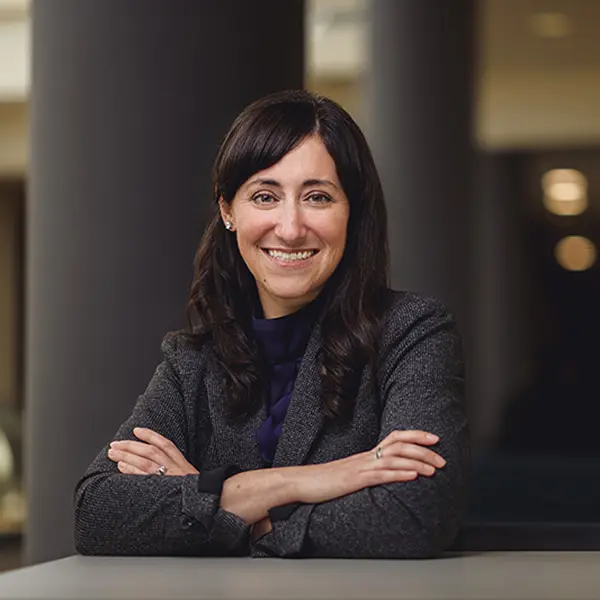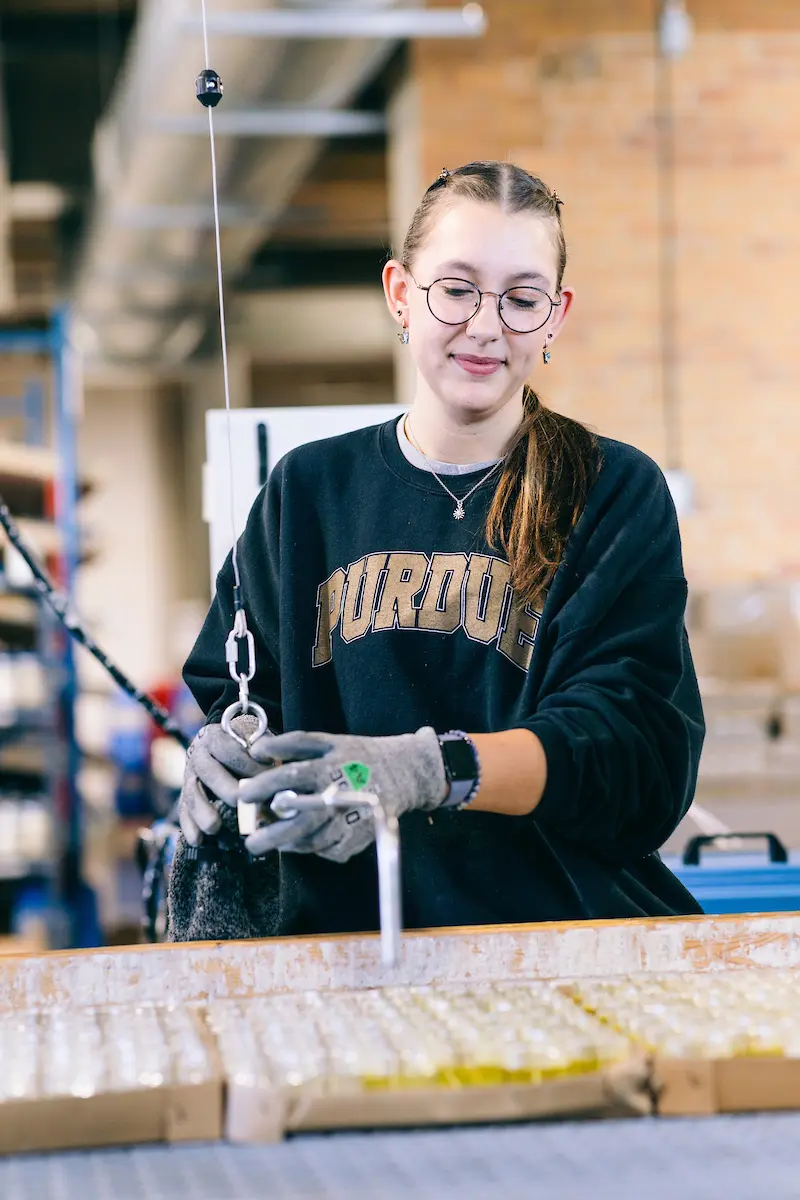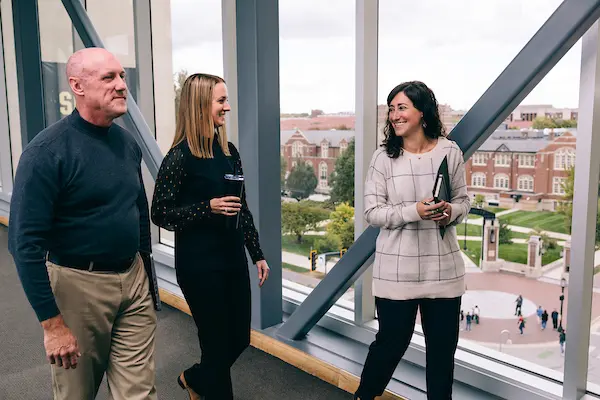
What does “working well” mean to organizations and their employees? How can we meet modern workforce challenges by promoting personal well-being, creating sustainable performance, adapting to grand challenges in modern organizations, and cultivating positive and inclusive relationships at work and home?

Those are only some of the issues being addressed by Purdue’s Center for Working Well, which was launched by the Mitchell E. Daniels, Jr. School of Business in fall 2023 with a mission to become a cutting-edge center at the forefront of challenges facing modern workforces and employees’ desire to “work well."
“My vision for the center is to be doing research and asking questions that speak to people’s rich lives at work and at home,” says Allison Gabriel, the Thomas J. Howatt Chair in Management at the Daniels School and director of the center. “What does it mean to be a remote or hybrid worker? How do we create meaning in our work? How do you build good workplace relationships? How do you create family-flexible policies and practices? How do we make people feel authentically valued in the workplace?”
Although still brand new, Gabriel says the center has grown more rapidly than she anticipated.
“The support we’ve received from the university and school has been fabulous, and organizations and other stakeholders in the community are excited about our existence too,” she says. “We have a plethora of faculty associates at Purdue spanning not only the Daniels School, but also areas like psychology and public health, among others. We also have eight doctoral associates and a group of faculty affiliates at other institutions who value the mission of the work that we're doing.”
Another key addition is Dr. Kasie Roberson, a clinical assistant professor in business communication at the Daniels School who recently joined the center as associate director of outreach and coaching. An executive coach for leadership and performance and a strategic communication expert with industry experience in marketing and communications, Roberson also teaches courses at the undergraduate, master’s and PhD levels.
“I'm excited to work with Allie and love the energy she brings to everything that she does with the center,” says Roberson. “In my role as the associate director of outreach and coaching, I’ll be working with companies who are interested in partnering with us, who understand our vision and see how we can offer impactful ways to help their employees.”

The Center for Working Well’s first industry partnership is with Antique Candle Co., a homegrown candle manufacturer and online retailer founded by Daniels School alumna Brittany Whitenack. The partnership was facilitated by Dr. Allie Gabriel and Megan Thompson, chief people officer at the Lafayette-based business, as part of Gabriel's Science of Working Well course for undergraduates.
“As a small team, we are excited for our growing families and want to support them well, but we also want to support our employees who are helping carry the workload while team members are out," says Thompson. "After providing them with some of our historical data surrounding parental leaves, the students will create research-based recommendations for Antique Candle Co. on how we can better support our employees who are helping cover some of the leaves.”
As part of the project, the students had the opportunity to meet with employees to get their questions answered. They were also invited for a tour of the facility to familiarize themselves with the workspace. At the end of the semester, the company will send another panel of employees to listen to the students' presentations and select a winner, who will receive extra credit for the course and candles from Antique Candle Co.
“We are excited to hear the students' thoughts and to learn from them as we improve our employees’ well-being,” Thompson says. “We’re committed to taking their recommendations and research and implementing their solutions wherever possible.”
The partnership also benefits students and the center, Gabriel says. “I think it's a powerful demonstration of how much of a moving target these working well challenges are,” she says. “And I think it also speaks to the importance of creating workplaces that allow employees to thrive as needs and goals change.”
Academically, the center is initially offering two courses — the Science of Working Well for undergraduates and Motivation and Well-Being for PhD candidates. The center also plans to host a conference every two to three years, as well as a “Working Well Symposium” in which organizational leaders gather to discuss challenges facing the well-being of their workforce.

“We’ve already had a lot of great programming,” Gabriel says. “In December, we held our first speaker series event with Theresa Glomb from the University of Minnesota, whose research centers on recovery and mindfulness.”
The center also launched a faculty research blog that addresses such issues as paternal leave, harassment in the workplace, coping with stressors, and employee empowerment, among other topics. “It's becoming a valuable resource for people who come to our center, want to know what we do, and want to learn about best practices,” Gabriel says. “In the long-term, we want the blog to become a one-stop shop for HR practitioners and use it to disseminate our research to the broader media.”
In addition, faculty associates across Purdue have the opportunity to apply for an annual grant program to fund research related to the mission of the center. The first grants were awarded to a Daniels School team researching individual dating app experiences and their influence on work and well-being, a Purdue College of Veterinary Medicine team investigating how companion animals provide mental, physical and social benefits to their human counterparts, and another Daniels School team looking at what they call “proactive pushbacks” against always-on work cultures.
“It’s important that our research has practical applications for organizations,” Gabriel says. “My hope is that as more companies learn about the center, they’ll want to partner with us and use our research and outreach initiatives to bring best practices back to their workplace to help employees work well.”
By supporting the Center for Working Well, you help organizations and employees work well by sustaining the research of the center, and supporting distinguished speakers and events to the public, as well as courses offered at the undergraduate and graduate level. Give Today